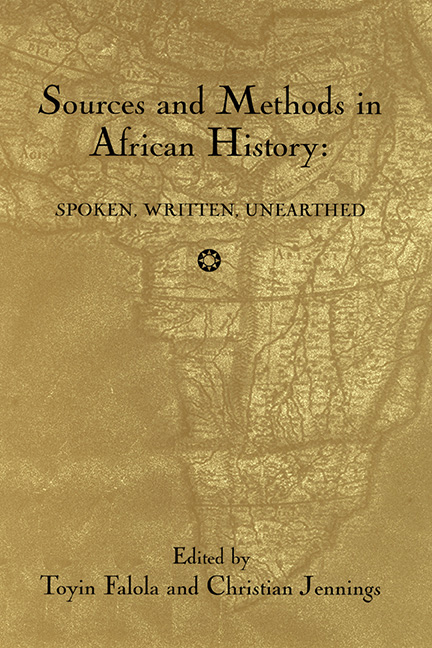Book contents
- Frontmatter
- Dedication
- Contents
- Acknowledgments
- Introduction
- Part I Archaeological Sources
- Part II Africa and the Atlantic World
- Part III Documentary Sources
- Part IV Oral Tradition
- Part V Innovative Sources and Methods
- 19 Section Introduction: Innovative Sources and Methods
- 20 Ben and Maggie: Consuming Data: Reassessing Scientific and Anthropological Evidence: Historical Perspective on Nutrition Studies
- 21 Electricity Networks in Africa: A Comparative Study, or How to Write Social History from Economic Sources
- 22 “Rain or Shine We Gonna' Rock”: Dance Subcultures and Identity Construction in Accra, Ghana
- 23 Sample Surveys: Underexploited Sources for African Social History
- Contributors
- Index
23 - Sample Surveys: Underexploited Sources for African Social History
from Part V - Innovative Sources and Methods
Published online by Cambridge University Press: 25 October 2017
- Frontmatter
- Dedication
- Contents
- Acknowledgments
- Introduction
- Part I Archaeological Sources
- Part II Africa and the Atlantic World
- Part III Documentary Sources
- Part IV Oral Tradition
- Part V Innovative Sources and Methods
- 19 Section Introduction: Innovative Sources and Methods
- 20 Ben and Maggie: Consuming Data: Reassessing Scientific and Anthropological Evidence: Historical Perspective on Nutrition Studies
- 21 Electricity Networks in Africa: A Comparative Study, or How to Write Social History from Economic Sources
- 22 “Rain or Shine We Gonna' Rock”: Dance Subcultures and Identity Construction in Accra, Ghana
- 23 Sample Surveys: Underexploited Sources for African Social History
- Contributors
- Index
Summary
Since the period between the two world wars, social scientists have conducted sample surveys among a variety of populations in Africa in an effort to formulate strategies to meet perceived contemporary challenges such as underdevelopment, rapid population growth, high levels of morbidity and mortality, excessive malnutrition, and so on. The retrospective nature of much of this research has led to the inadvertent collection of large bodies of historical data. For the most part, however, once these surveys have been completed and projects designed to help cope with these immediate problems, the data have been relegated to storage. The social scientists who developed the surveys have, on the whole, not been preoccupied with historical questions, and historians who might make use of their data are either unaware of these studies or do not know how to access and use them for their research.
This paper explores surveys as historical sources, both surveys that collected then-current data and those that assembled retrospective data, with a particular focus on demographic studies. The essay opens with a discussion of the characteristics of surveys and an overview of the range of survey data. The paper then features as a central case study the National Migration Survey conducted in today's Burkina Faso (formerly Upper Volta) in 1974–1975. My colleagues Victor Piché and Joel Gregory of the Université de Montréal initially conceived the National Migration Survey as a study whose conclusions would aid in the formulation of development projects that might stem the emigration of burkinabè men and women to the Côte d'Ivoire, Ghana, and other countries. Later, they and I realized that the survey was, in addition, an invaluable source for tracing the history of burkinabè migration in the twentieth century. We mined the National Migration Survey as a major source for the social history of burkinabè migration in several articles and a major monograph. The essay concludes with a brief mention of specific surveys, including the extensive World Fertility Survey (WFS) and the Demographic and Health Surveys (DHS), that might be marshaled as historical sources in our efforts to understand the social history of Africa in the twentieth century.
- Type
- Chapter
- Information
- Sources and Methods in African HistorySpoken Written Unearthed, pp. 376 - 392Publisher: Boydell & BrewerPrint publication year: 2003

